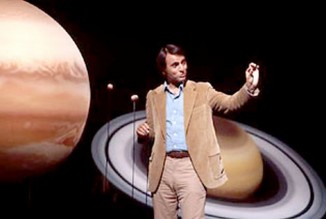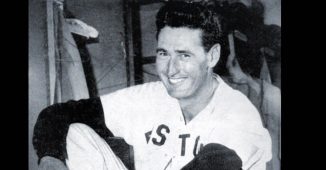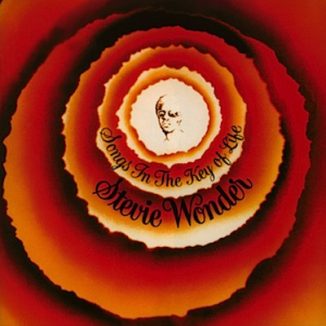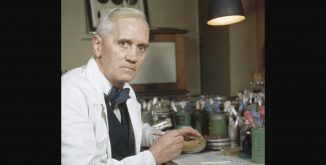37 years ago today, Star Trek: The Next Generation debuted on syndicated TV. Spanning 178 episodes over seven seasons, it starred English actor Patrick Stewart as Captain Jean-Luc Picard of the Starship Enterprise. It received many accolades, including 19 Emmy Awards, two Hugo Awards, five Saturn Awards, and a Peabody Award. READ more about how the show got started… (1987)

Paramount Pictures, which produced Star Trek: The Original Series, was generally amazed at the staying power of the show. Chairman Frank Mancuso Sr. observed that “The shelf life in this business is usually three days. To flourish for 20 years…” before calling it a “priceless asset.”
Early proposals for The Next Generation included one in which some of the original series cast might appear as “elder statesmen,” and Roddenberry speculated as late as October 1986 that the new series might not even use a spaceship, as “people might travel by some [other] means” 100 years after the USS Enterprise.
A more lasting change was his new belief that workplace interpersonal conflict would no longer exist in the future; thus, the new series did not have parallels to the frequent “crusty banter” between Kirk, Spock, and Leonard McCoy.
After a rocky start in which Roddenberry was determined to depict humanity’s behavior as lacking base motives of power, greed, or lust, the series kicked on driven by Stewart’s acclaimed acting. The last episode of season 3 is considered the finest of the whole show, and by then millions were tuning in every week.
MORE Good News on this Day:
42 years ago, the thirteen-part astronomy series Cosmos: A Personal Voyage debuted on American Public Television. Hosted by Carl Sagan, it was the most-watched TV series in America until Ken Burns’ The Civil War ten years later. Cosmos covered a wide range of scientific topics such as the solar system’s place in the galaxy, the origin of life, the birth and death of stars, etc. Sagan was America’s most beloved space science communicator, and with him in the lead, the series went on to win two Emmys and a Peabody Award.

Cosmos has been broadcast in 60 different countries, and been viewed 500 million times. The series is notable for its companion book and wonderful soundtrack, as well as its groundbreaking use of special effects, which allow Sagan to seemingly walk through environments that are actually models rather than full-sized sets.
The episodes are not all just ruminations on complex physics, but usually begin with something originating from Earth—the origin of astrology for example as a basis for astronomy, the meetings between Europeans and uncontacted tribes as the table-setter for discussions on aliens, or many of the old Greek or Renaissance philosophers ideas. (1982)
83 years ago today, baseball player Ted Williams of the Boston Red Sox finished the season with a .406 batting average. No major league player since Williams has ever achieved an average higher than .400—which translates to getting a hit 4 times during every ten trips to the plate.
Though he had offers from the St. Louis Cardinals and the New York Yankees while he was still in high school, his mother thought he was too young to leave home, so he signed up with the local minor league club in San Diego, and—despite respiratory problems that would plague him for the rest of his life—soon became a triple-threat, dominating in batting average, home runs, and runs batted in. Throughout his career, Williams stated his goal was to have people point to him and remark, “There goes Ted Williams, the greatest hitter who ever lived.” (1941)
 Ted Williams, public domain
Ted Williams, public domain
And, today is the birthday of Confucius, born in 551 BCE. The Chinese philosopher emphasized personal and governmental morality, caring social relationships, justice and sincerity. His golden rule to guide a person through life, formulated five centuries before Jesus was, “Never impose on others what you would not choose for yourself.”
237 years ago today, the recently completed US Constitution that was created to set up a framework of government for the new nation, was submitted to the 13 States.
 Dates of ratification map by Drdpw, CC license
Dates of ratification map by Drdpw, CC licenseThe US Congress voted unanimously to do so, but with no recommendation either for or against its adoption. It would go into full force upon the approval of nine (two-thirds of the 13) states, which was achieved on June 21 of the following year. (1787)
And, on this day in 1976, Stevie Wonder released his eighteenth studio album Songs in the Key of Life. The ambitious double LP debuted at No.1 on the Billboard Chart—only the third album in history to achieve that feat, and the first by an American artist.
The Motown Records LP, which included a four-song bonus disk, was the most critically acclaimed of Wonder’s career, selling 10 million copies in the U.S. alone, with 13 consecutive weeks at number one. Two years before he commenced work on the LP, Wonder had moved to Ghana to work with handicapped children.

And, 96 years ago today, Sir Alexander Fleming noticed a bacteria-killing mold growing in his laboratory, a discovery that would become the world’s first antibiotic—penicillin. The Scottish physician and Professor of Bacteriology had served throughout World War I in the British Army Medical Corps and witnessed the death of many soldiers from infected wounds, and began searching for a solution. One morning, after having left his laboratory a mess, he returned from vacation and found a mold had killed the staphylococci culture in the Petrie dish and commented, “That’s funny!”
Fleming published his discovery the following year, in the British Journal of Experimental Pathology, but little attention was paid to his article. But it changed the course of medicine, and won him the Nobel Prize for Physiology, and many other awards. The room where Fleming discovered and tested penicillin is preserved as the Alexander Fleming Laboratory Museum in St. Mary’s Hospital, Paddington. WATCH a great 2-minute video on the Biography Channel website. (1928)
SHARE The Milestones, Memories, and Music…
Source link

